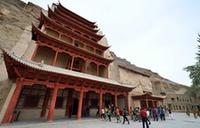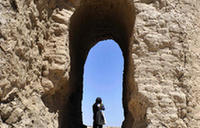Mogao Grottoes sees fresco resotred in seven decades
Updated: 2014-09-11 10:00
(Xinhua)
|
||||||||
Deep within a network of caves lining the shores of the Dunhuang oasis in Gansu province, thousands of 1,600-year-old Buddhist sculptures sit in silent decay.
The Mogao Grottoes, the collection of buddhist artworks occupying the caves on a 1,700-meter cliff which are considered one of finest in existence, was listed as a world heritage site in 1987.
|
|
With most of the frescos and sculptures dating back to 400 AD, hundreds of years spent in the damp confines of the caves has taken its toll on the precious works, says Wang Xudong, deputy president of Dunhuang Academy.
Wang and his colleges have spent decades countering the corrosion in the ancient cultural site.
As the academy celebrates its 70th anniversary this month, they are celebrating the 5,000 sq meter restoration milestone while digging in to continue their exhaustive efforts.
Since its establishment in 1944, the academy has devoted its resources in repairing and restoring the antique wall paintings in the grottos.
Located in nearby Dunhuang city, the academy boasts a team of highly skilled specialists who, in addition to decades restoring the artworks, have spent the last few years photographing the frescos in hopes that even if the buddhist art falls to decay, digital references will last for centuries to come.
Using modern technology, they've also devised processes to "cure" the cracked, flaked, faded and detached murals.
Their goal, Wang says, is to "prolong the life of the world cultural heritage site" indefinitely.
Known as the Thousand Buddha Caves, the Mogao grottoes consist of 735 caves, with the ancient buddhist frescos on the inside walls covering a combined area of 45,000 square meters. The paintings are considered among the preserved in the world.
Ever since the 1980s, the academy joined with relic protection institutions worldwide in exploring mural restoration technologies and cultivating talents to help keep the site alive.
In 2009, the National Engineering Research Center for Conservation of Ancient Wall Paintings was set up in the academy to serve as a state-level engineering center on ancient mural restoration for both Mogao grottoes and other ancient murals around the country.
Of China's 38 sites on the World Heritage List, 11 have ancient murals. Dunhuang, a booming town on the ancient Silk Road, is home to more than 800 grottos that are at least 1,600 years old.

 Star Stefanie Sun holds concert in Beijing
Star Stefanie Sun holds concert in Beijing
 Faye Wong's manager refutes star's drug rumors
Faye Wong's manager refutes star's drug rumors
 Lu Yi and daughter Bei Er pose for street snaps
Lu Yi and daughter Bei Er pose for street snaps
 Photoshoots of actress Li Xiaomeng
Photoshoots of actress Li Xiaomeng
 Council of Fashion Designers of America Awards
Council of Fashion Designers of America Awards
 Fan Bingbing, first Chinese actress in Barbie Hall of Fame
Fan Bingbing, first Chinese actress in Barbie Hall of Fame
 Awarding ceremony of 2014 hito Pop Music held in Taipei
Awarding ceremony of 2014 hito Pop Music held in Taipei
 Zhao Liying's photo shoot for Children's Day
Zhao Liying's photo shoot for Children's Day
Most Viewed
Editor's Picks

|

|

|

|

|

|
Today's Top News
Obama: Joint force vs ISIS
Money for visa freeze lifts Oct 1
Chinese firms in US advised to learn rules
McDonald's faces woes in US, abroad
Obama to authorize air strikes in Syria against IS
China capable of hitting growth targets, Li says
Li reassures investors on investigations
Texas governor tours China
US Weekly

|

|









